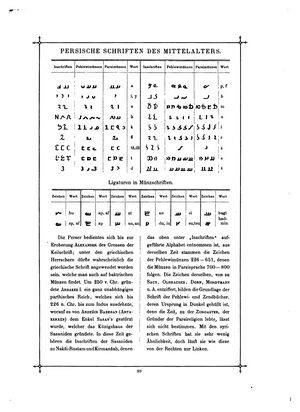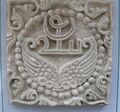پهلوي النقوش
| پهلوي النقوش Inscriptional Pahlavi | |
|---|---|
 Inscribed stone block from the Paikuli inscription | |
| النوع | |
| اللغات | اللغات الإيرانية الوسيطة |
| الفترة الزمنية | القرن الثاني ق.م. — القرن السادس الميلادي |
النظم الوالدة | الأبجدية الأرامية
|
| الاتجاه | Right-to-left |
| ISO 15924 | Phli, 131 |
مرادف اليونيكود | Inscriptional Pahlavi |
| U+10B60–U+10B7F | |
Inscriptional Pahlavi is the earliest attested form of Pahlavi scripts, and is evident in clay fragments that have been dated to the reign of Mithridates I (r. 171–138 BC). Other early evidence includes the Pahlavi inscriptions of Parthian coins and rock inscriptions of Sasanian emperors and other notables, such as Kartir the High Priest.
الحروف
Inscriptional Pahlavi used 19 non-joining letters:[1][2]
| Name[A] | Image | Text | IPA[3] |
|---|---|---|---|
| Aleph | 𐭠 | /a/, /aː/ | |
| Beth | 𐭡 | /b/, /w/ | |
| Gimel | 𐭢 | /ɡ/, /j/ | |
| Daleth | 𐭣 | /d/, /j/ | |
| He | 𐭤 | /h/ | |
| Waw-Ayin-Resh | 𐭥 | /u/, /o/, /v/, /ʕ/, /r/ | |
| Zayin | 𐭦 | /z/ | |
| Heth | 𐭧 | /h/, /x/ | |
| Teth | 𐭨 | /tˤ/ | |
| Yodh | 𐭩 | /j/, /eː/, /iː/, /d̠͡ʒ/ | |
| Kaph | 𐭪 | /k/, /ɡ/ | |
| Lamedh | 𐭫 | /l/, /r/ | |
| Mem-Qoph | 𐭬 | /m/, /q/ | |
| Nun | 𐭭 | /n/ | |
| Samekh | 𐭮 | /s/, /h/ | |
| Pe | 𐭯 | /p/, /b/, /f/ | |
| Sadhe | 𐭰 | /t̠͡ʃ/, /d̠͡ʒ/, /z/ | |
| Shin | 𐭱 | /ʃ/ | |
| Taw | 𐭲 | /t/, /d/ |
الأعداد
Inscriptional Pahlavi had its own numerals:
| Value | 1 | 2 | 3 | 4 | 10 | 20 | 100 | 1000 | |
|---|---|---|---|---|---|---|---|---|---|
| Sign | Image | ||||||||
| Text | 𐭸 | 𐭹 | 𐭺 | 𐭻 | 𐭼 | 𐭽 | 𐭾 | 𐭿 | |
Numbers are written right-to-left. Numbers without corresponding numerals are additive. For example, 24 is written as 𐭽𐭻 (20 + 4).[1]
يونيكود
Inscriptional Pahlavi script was added to the Unicode Standard in October, 2009 with the release of version 5.2.
The Unicode block for Inscriptional Pahlavi is U+10B60–U+10B7F:
| Inscriptional Pahlavi[1] Unicode.org chart (PDF) | ||||||||||||||||
| 0 | 1 | 2 | 3 | 4 | 5 | 6 | 7 | 8 | 9 | A | B | C | D | E | F | |
| U+10B6x | 𐭠 | 𐭡 | 𐭢 | 𐭣 | 𐭤 | 𐭥 | 𐭦 | 𐭧 | 𐭨 | 𐭩 | 𐭪 | 𐭫 | 𐭬 | 𐭭 | 𐭮 | 𐭯 |
| U+10B7x | 𐭰 | 𐭱 | 𐭲 | 𐭸 | 𐭹 | 𐭺 | 𐭻 | 𐭼 | 𐭽 | 𐭾 | 𐭿 | |||||
Notes
| ||||||||||||||||
معرض
Inscriptional Pahlavi text from Shapur III at Taq-e Bostan, 4th century
Kartir's inscription at Naqsh-e Rajab
Coin of Ardashir I (r. 224–42) with Inscriptional Pahlavi writings
المراجع
- ^ أ ب ت Everson, Michael; Pournader, Roozbeh (2007-08-24). "L2/07-207R: Proposal for encoding the Inscriptional Parthian, Inscriptional Pahlavi, and Psalter Pahlavi scripts in the SMP of the UCS" (PDF).
- ^ Livinsky, BA; Guang‐Da, Zhang; Samghabadi, R Shabani; Masson, Vadim Mikhaĭlovich (March 1999), Dani, Ahmad Hasan, ed., History of civilizations of Central Asia, Multiple history, 3. The crossroads of civilizations: A.D. 250 to 750, Delhi: Motilal Banarsidass, p. 89, ISBN 978-81-208-1540-7.
- ^ Daniels, Peter T.; Bright, William, eds. (1996). The World's Writing Systems. Oxford University Press, Inc. pp. 518. ISBN 978-0195079937.




